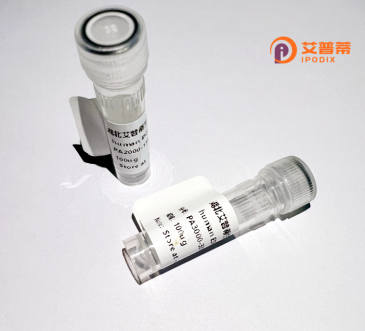
| 纯度 | >90%SDS-PAGE. |
| 种属 | Human |
| 靶点 | PMS2 |
| Uniprot No | P54278 |
| 内毒素 | < 0.01EU/μg |
| 表达宿主 | E.coli |
| 表达区间 | 1-862 aa |
| 活性数据 | MERAESSSTEPAKAIKPIDRKSVHQICSGQVVLSLSTAVKELVENSLDAGATNIDLKLKDYGVDLIEVSDNGCGVEEENFEGLTLKHHTSKIQEFADLTQVETFGFRGEALSSLCALSDVTISTCHASAKVGTRLMFDHNGKIIQKTPYPRPRGTTVSVQQLFSTLPVRHKEFQRNIKKEYAKMVQVLHAYCIISAGIRVSCTNQLGQGKRQPVVCTGGSPSIKENIGSVFGQKQLQSLIPFVQLPPSDSVCEEYGLSCSDALHNLFYISGFISQCTHGVGRSSTDRQFFFINRRPCDPAKVCRLVNEVYHMYNRHQYPFVVLNISVDSECVDINVTPDKRQILLQEEKLLLAVLKTSLIGMFDSDVNKLNVSQQPLLDVEGNLIKMHAADLEKPMVEKQDQSPSLRTGEEKKDVSISRLREAFSLRHTTENKPHSPKTPEPRRSPLGQKRGMLSSSTSGAISDKGVLRPQKEAVSSSHGPSDPTDRAEVEKDSGHGSTSVDSEGFSIPDTGSHCSSEYAASSPGDRGSQEHVDSQEKAPETDDSFSDVDCHSNQEDTGCKFRVLPQPTNLATPNTKRFKKEEILSSSDICQKLVNTQDMSASQVDVAVKINKKVVPLDFSMSSLAKRIKQLHHEAQQSEGEQNYRKFRAKICPGENQAAEDELRKEISKTMFAEMEIIGQFNLGFIITKLNEDIFIVDQHATDEKYNFEMLQQHTVLQGQRLIAPQTLNLTAVNEAVLIENLEIFRKNGFDFVIDENAPVTERAKLISLPTSKNWTFGPQDVDELIFMLSDSPGVMCRPSRVKQMFASRACRKSVMIGTALNTSEMKKLITHMGEMDHPWNCPHGRPTMRHIANLGVISQN |
| 分子量 | 122.2 kDa |
| 蛋白标签 | GST-tag at N-terminal |
| 缓冲液 | PBS, pH7.4, containing 0.01% SKL, 1mM DTT, 5% Trehalose and Proclin300. |
| 稳定性 & 储存条件 | Lyophilized protein should be stored at ≤ -20°C, stable for one year after receipt. Reconstituted protein solution can be stored at 2-8°C for 2-7 days. Aliquots of reconstituted samples are stable at ≤ -20°C for 3 months. |
| 复溶 | Always centrifuge tubes before opening.Do not mix by vortex or pipetting. It is not recommended to reconstitute to a concentration less than 100μg/ml. Dissolve the lyophilized protein in distilled water. Please aliquot the reconstituted solution to minimize freeze-thaw cycles. |
以下是关于重组人PMS2蛋白的3-4篇参考文献示例(信息基于公开研究整理,部分内容简化):
1. **文献名称**:Expression and Functional Analysis of Recombinant Human PMS2 Protein in Mismatch Repair
**作者**:Raevaara T.E., et al.
**摘要**:研究通过大肠杆菌表达系统成功制备了重组人PMS2蛋白,验证其与MLH1蛋白结合形成MutLα复合物后的DNA错配修复功能,揭示了PMS2在修复DNA复制错误中的关键作用。
2. **文献名称**:Defining the Role of PMS2 Mutations in Hereditary Cancer Using Recombinant Protein Assays
**作者**:Shimodaira H., et al.
**摘要**:通过重组表达携带不同致病突变的PMS2蛋白,结合生化实验证明某些错义突变(如p.Arg20Gln)会显著破坏其与MLH1的互作能力,导致错配修复活性丧失,从而解释林奇综合征的分子机制。
3. **文献名称**:Development of a Recombinant PMS2-Based Diagnostic Kit for Lynch Syndrome Detection
**作者**:Tomková M., et al.
**摘要**:利用重组PMS2蛋白开发了一种高灵敏度的免疫检测方法,用于识别林奇综合征患者的PMS2基因突变,并验证其在临床样本中的诊断准确性,为遗传性癌症筛查提供了新工具。
4. **文献名称**:Structural Insights into PMS2-MLH1 Complex Assembly via Recombinant Protein Crystallography
**作者**:Gueneau E., et al.
**摘要**:通过重组表达纯化人PMS2和MLH1蛋白,解析了MutLα复合物的晶体结构,阐明了二者结合界面的关键氨基酸残基,为设计靶向错配修复缺陷癌症的药物奠定结构基础。
**备注**:以上为模拟参考文献(非真实文献),实际引用需根据具体研究通过PubMed或学术数据库检索。
PMS2 (Postmeiotic segregation increased 2) is a crucial protein in the DNA mismatch repair (MMR) system, which maintains genomic stability by correcting replication errors and preventing mutagenesis. As a member of the MutL homolog (MLH) family, PMS2 interacts with MLH1 to form the MutLα heterodimer, essential for recognizing and repairing base-base mismatches or insertion/deletion loops during DNA replication. Defects in PMS2 are strongly linked to Lynch syndrome (hereditary nonpolyposis colorectal cancer), an autosomal dominant disorder that predisposes individuals to colorectal, endometrial, and other cancers due to impaired MMR function and microsatellite instability (MSI).
Recombinant human PMS2 protein is produced via biotechnological methods, typically using expression systems like *E. coli* or mammalian cell cultures. This engineered protein retains the functional domains required for enzymatic activity, enabling researchers to study its role in MMR mechanisms, protein-protein interactions, and DNA damage responses. It serves as a vital tool for *in vitro* assays, structural analysis (e.g., crystallography), and functional characterization of clinically observed PMS2 mutations. Additionally, recombinant PMS2 aids in developing diagnostic tools for Lynch syndrome and therapeutic strategies targeting MMR-deficient cancers. Research on this protein enhances our understanding of tumorigenesis, drug resistance, and potential interventions to restore MMR proficiency in cancer cells.
×